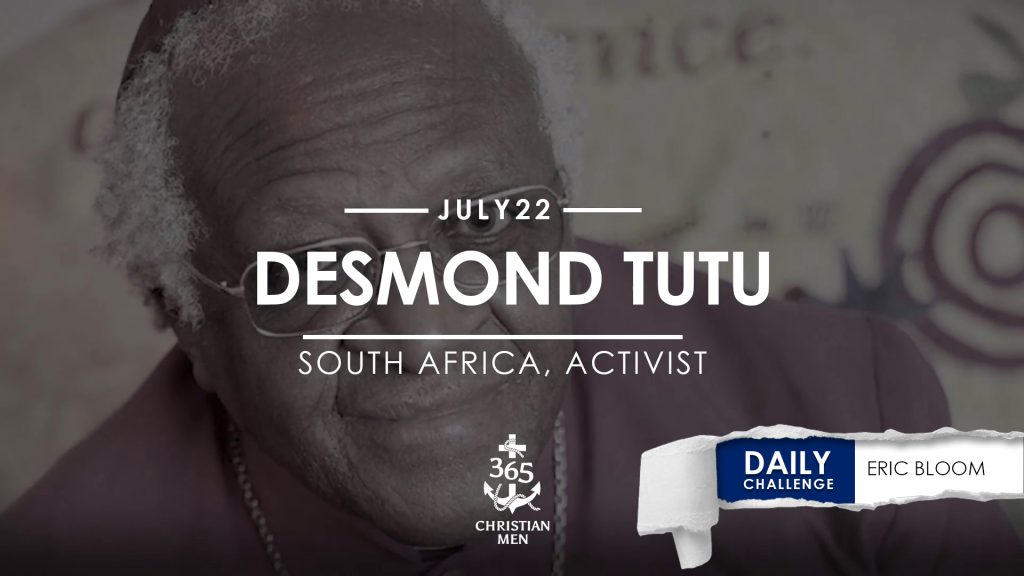July 22. Desmond Tutu. Desmond went to a segregated and underfunded all-Black school in South Africa, where he excelled, by the way.
He once told an audience, “… many of the people who taught us … inspired you to want to emulate them and really to become all that you could become, … They gave you the impression that … even with all of the obstacles … in your way; you can reach out to the stars.”
Desmond reached and reached for himself and others and fought so hard against the evil discrimination of apartheid, that he was awarded the Nobel Peace Prize.
Every action done in the name of justice can inspire big changes.
Desmond was a young man when he received permission from the South African government to study theology in London. He arrived in London in August 1962, almost shell-shocked at how different England was from apartheid-controlled South Africa.
At Heathrow Airport, lines weren’t segregated by skin color. Police officers didn’t zero in on his African heritage, but treated him with kindness and called him “sir.” He could eat at any restaurant or go to any hotel. He could live in whatever neighborhood he wanted. He could even preach at a church with a white congregation.
England was like a completely different world.
The way he had grown up, segregation was the norm. But as he saw how different and better things were in England, he wondered if things could be different and better in South Africa, too.
Desmond moved to Golders Green, a suburb in northeast London. One day, as he went to the Midlands Bank to do some business, he got in line like all the other customers, waiting for his turn with the teller. But as his turn came up next, a man rushed to the counter in a hurry, cutting in line so he could go next.
Desmond didn’t blink or get angry, because that was the norm back home in South Africa. White men could cut the line without question. Instead, he stepped back, letting the man get in front of him. But the teller saw what had happened, and instead of waiting on the man who cut the line, she scolded him. Her eyes remained on the man, and her voice was firm yet polite. She apologized that the man would have to wait longer, but reminded him that Desmond was next.
She pointed at Desmond, and she waited until the man, who cut the line left and went to the spot he was supposed to be in. When he did, the teller went on to wait on her customers, but as Desmond watched the scene unfold, he stood there shocked and amazed.
Such displays of fairness weren’t heard of under apartheid. Desmond almost didn’t know what it was like to see true justice be done, whether big or small. And after he left the bank and went about his day, he found himself awed by what had happened at the bank.
The teller stood up for him when no one else would. She didn’t hold his skin color against him. She saw that he was a man just like the other men there, and he deserved to be treated equally and fair like any other customer.
The revelation shook him to his core, and he returned to the bank that evening to speak with her. She didn’t remember the incident. Such things happened at the bank all the time. But he told her how much it changed his life, and even decades afterwards, her show of justice was one of the big stepping stones for Desmond in becoming an activist for justice himself.
He would promote fairness and equality in South Africa and other parts of the world. He would make sure anyone suffering under apartheid or inequality knew that they deserved to be treated fairly, too. In God’s eyes, he was a man just like any other. The teller reminded him of that, and he was determined to remind others of that, too.
“Good will come to those who are generous and lend freely, who conduct their affairs with justice” (Psalm 112:5 NIV).
Change is only possible if people speak up and step out. Every action done in the name of justice can inspire big changes.
Allen, John. Desmond Tutu: Rabble-Rouser for Peace, the Authorized Biography. Chicago, IL: Lawrence Hill Books, 2008.
Sparks, Allister, and Mpho A. Tutu. Tutu: Authorized. Harper Collins Publishers Limited, 2011.
Story read by: Daniel Carpenter
Introduction read by: Daniel Carpenter
Audio production: Joel Carpenter
Editor: Teresa Crumpton, https://authorspark.org/
Project manager: Blake Mattocks
© 2020, 365 Christian Men, LLC. All rights reserved.





